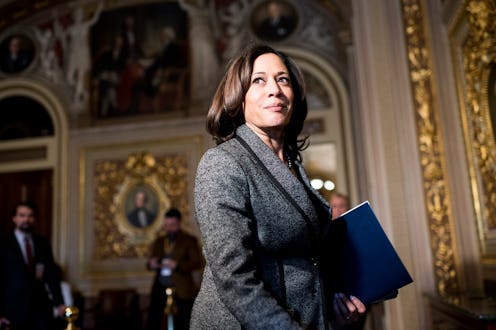Politics
5 Things Kamala Harris Would Do As Vice President
Need a quick refresher? We’ve got you covered.

On Aug. 11, former Vice President Joe Biden announced Sen. Kamala Harris as his running mate for the 2020 presidential election. The selection marks the continued shift toward a more ethnically, racially, and gender diverse U.S. government. She will be the first Black woman to be nominated for Vice President by a major political party, and the first South Asian American woman. Should Biden win in November, she would be the first woman elected into the White House.
But what could she actually do as VP? The framers of the Constitution originally created the office as a backup in case something happened to a sitting president, leading to the old adage of the VP being a “heartbeat away from the presidency.” But the role has since evolved and gained power. As President Obama’s vice president, Biden was instrumental in turning the two offices into a partnership, often taking the lead during meetings on Middle East policy and working as Obama’s “proxy,” according to Politico. Christian Paz at The Atlantic even speculates that the next vice president might be the most powerful in history.
If the Biden-Harris Democratic ticket wins on Nov. 3, there are five responsibilities she will have come Inauguration Day.
1She’d be president of the senate.
According to Article II, Section 3 of the Constitution, it’s the VP’s job to preside over the daily proceedings of the U.S. Senate and cast tie-breaking votes as needed. Vice President Mike Pence has cast the most of any VP since the 1800s, with 13 senate tie votes. According to the current White House website, the VP usually delegates the task of daily Senate oversight to another member of the party. Currently Pence has delegated that responsibility to Sen. Chuck Grassley, a Republican from Iowa who serves as Senate president pro tempore.
2She’d represent Biden when he’s unavailable.
Aside from actually governing, being a head of state means going on diplomatic visits, attending events, and speaking to the public. Biden wouldn't be able to be everywhere at once, so Sen. Harris would likely represent the administration on international tours to discuss foreign policy, like Biden often did for Obama, and attend global conferences, like Al Gore did for Bill Clinton. When Biden was VP, he travelled over 1.2 million miles through 50 countries on behalf of President Obama.
3She’d work with Congress to accomplish the administration’s agenda.
Administrations will often establish “task forces” to address key issues on their agenda, and the vice president often plays a leadership role. As VP, Biden was head of the Middle-Class Task Force, which sought to improve economic welfare of middle class families under Obama. Biden also advocated for and oversaw the Recovery Act, which was established to help alleviate the economic impact of the 2008 recession.
4She’d coordinate responses to national emergencies.
Since a COVID-19 vaccine isn’t likely to arrive until 2021, whoever wins the 2020 election will manage the continued pandemic response, much like Biden did during the country’s responses to H1N1 and Ebola under President Obama. Similarly, Trump called on Pence to head the coronavirus task force after the White House removed Health and Human Services Secretary, Alex Azar, from the role in February.
5She’d advise Biden on her areas of expertise.
As the nation faces a reckoning following centuries of racism, Biden has said he will “seek to heal the wounds that have long plagued this country.” However, he’s gotten flak for not leaning into bold criminal justice reform. Much like Clinton turned to Gore to advise him on his administration’s climate policies, Biden would probably lean on Harris for advice when it comes to racial justice, women’s rights, and criminal justice. Harris’ background as California state attorney general and a prosecutor brings Biden’s team a breadth of criminal justice expertise.
This article was originally published on